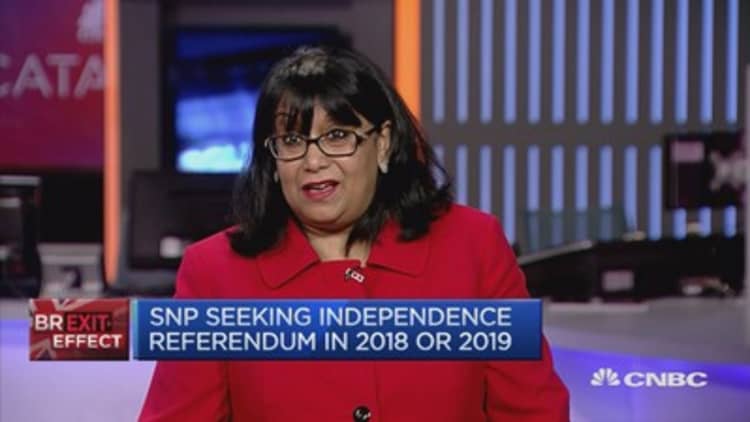
Growth in Britain will be damaged if politicians can't do a deal to avoid the costs of leaving the EU customs union, according to a new report from the House of Lords.
The European Union is Britain's largest trading partner with almost £357 billion ($431 bn) of goods flowing between the two each year, according to 2016 figures from the Office for National Statistics.
Now the EU External Affairs Sub-Committee, chaired by Baroness Verma, has published a report Tuesday studying how Brexit will affect the U.K.'s trade with the European Union.
The report found that avoiding barriers to trade will be essential if the U.K. is to succeed in its commitment to pushing growth in regions where manufacturing and agriculture are prevalent.
"The manufacturing and primary commodities sectors are integrated into efficient EU-wide supply chains.
"Supplies and components may cross the Channel multiple times during production, and tariffs on UK-EU trade in goods could be imposed every time, increasing costs.
"Many UK businesses cannot easily substitute their imports from the EU, or find alternative export destinations," the report stated.
The study concluded that leaving the EU customs union would mean increased administrative costs for U.K. firms as well as possible delays to deliveries.

Baroness Verma added in an accompanying press release that negotiators may not have time to secure free trade agreements by the time Brexit becomes official.
"Agreeing a free trade agreement within two years is inherently ambitious, so the Government must try to agree a transitional arrangement with the EU," she said.
Baroness Verma said non-tariff barriers such as labelling requirements, additional inspections or anti-dumping duties were also a source of concern for many British businesses.
"Non-tariff barriers can pose as significant or greater barrier to trade as tariffs, and would be more difficult to resolve in a free trade agreement. Witnesses from industry said this is a pressing concern."
The report stated that the British government may benefit from allowing some regulations to remain under the control of Brussels.
"There may be significant benefits in the UK continuing to participate, where possible, in EU agencies such as the European Medicines Agency and the European Aviation Safety Agency.
"The Government should clarify whether it would accept being subject to some form of oversight and dispute resolution to so do," it suggested.
The Lords report also claimed Whitehall, Britain's civil service hub, would need more resources to deal with the additional costs and loopholes that will arise from future EU-U.K. trade


